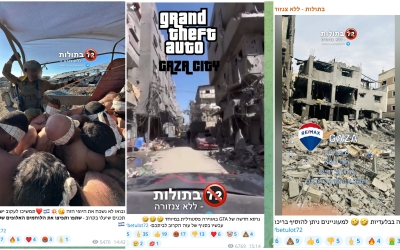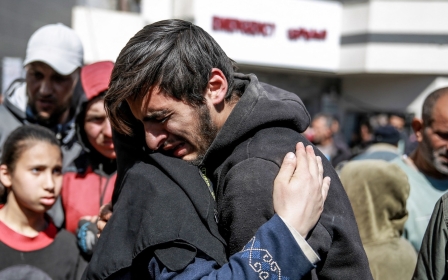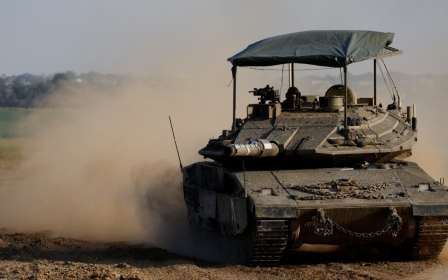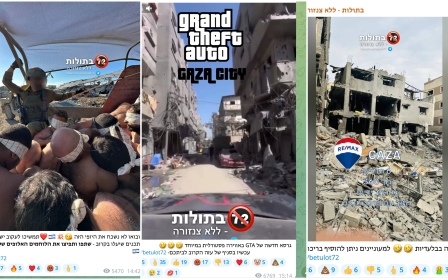War on Gaza: Israelis threaten to kill prominent Palestinian doctor on Telegram channel

A prominent Palestinian doctor in Gaza has spoken out against Israelis threatening to have him killed in a Telegram channel.
Dr Mohammed Qudaih, who has been working across Gaza's hospitals since the start of the war, including in the Nasser Medical Complex, said on Tuesday that he was first made aware of the threats against him by one of his followers on Instagram.
In a post on the platform, he shared screenshots of Israelis responding to a video he had shared.
The Israelis posted menacing messages that read "rat meat must be very popular" and "still alive but not for long".
Other comments read: "Let them continue to grind themselves" and "you will all die, your lives will be burned".
New MEE newsletter: Jerusalem Dispatch
Sign up to get the latest insights and analysis on Israel-Palestine, alongside Turkey Unpacked and other MEE newsletters
Qudaih said that, despite the messages, he would continue to document the atrocities he witnesses on a daily basis.
"This will not scare me, and I will continue to present and communicate everything I see in front of me inside the surgical room," he said in a post.
Nevertheless, he said the messages had been a growing cause of concern for him. Qudaih called on people to share the threats he is facing with major media outlets.
Ongoing death threats
Speaking to Middle East Eye, he said that he is not the only one that has been targeted with death threats since the start of the war.
"It's not strange for us to recieve or see such messages threatening to kill us and cursing at us in a racist manner," he said.
"We have been experiencing this level of threat for nearly 80 years by occupiers who try to displace and kill us in the most horrific ways possible and commit massacres against defenceless civilians," he added.
The groups, which often share graphic content and jokes about the killing of Palestinians and the razing of their homes, have been denounced as a form of "psychological warfare" and a tool for fuelling violence.
According to Qudaih, the threats cause panic and stress on individuals.
"At first, for a short period of time I felt like I was in danger and I was confused because it was the first time I saw such threats against me, but later I reaised that I was not the first to recieve such threats or be killed in Gaza," he said.
"There are tens of thousands of others in Gaza who have been killed in cold blood, and I am no better than them. Recieveing such messages now makes me happy because it shows that I am on the right path by showing Israel's crimes," he added.

Marwa Fatafta, the policy director for the digital rights organisation Access Now, previously told Middle East Eye that the rhetoric on the channel could have dangerous consequences.
"The history of past genocides and atrocities has taught us that words can be fatal. Depicting Palestinians as less human - as 'human animals', 'roaches', or 'rats' - serves to justify and tolerate abhorrent crimes and violence inflicted on them," she explained.
"This type of content feeds into the Israelis' strong lust for revenge after the 7 October attacks and can perpetuate endless cycles of violence," she added.
Over 30,000 Palestinians have been killed by Israeli forces in Gaza since the start of the war, with around 70,000 people wounded. There are also at least 7,000 people missing, believed dead and buried under the rubble.
Over 70 percent of the victims are children and women, according to Palestinian health officials.
Middle East Eye delivers independent and unrivalled coverage and analysis of the Middle East, North Africa and beyond. To learn more about republishing this content and the associated fees, please fill out this form. More about MEE can be found here.




